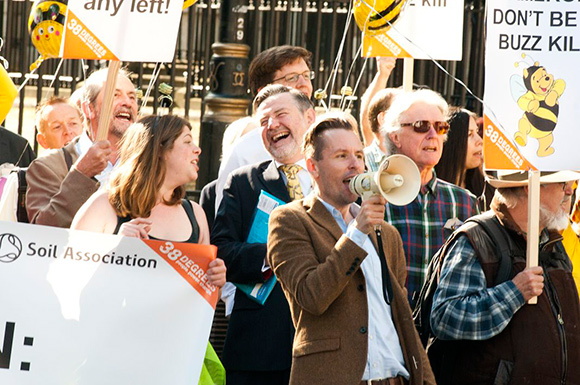
May 21st, 2014
Where UK political parties stand on issues important to 38 Degrees
By Rachel Oliver
When asked to respond to a series of questions about important issues ahead of the EU elections, here’s what UK parties had to say…
1) How will MEPs from your party go about stopping the NHS, our welfare and the environment from being threatened by global trade agreements like the Trans-Atlantic Trade and Investment Partnership (TTIP)?
Parties standing in all regions
Conservative: The TTIP aims to tackle market access issues and technical barriers to transatlantic trade and could bring an extra £10 billion to the UK each year – £400 for every household. The TTIP is part of our long term economic plan to secure a better future for Britain by promoting trade; it is not intended to open the NHS up to competition from American multinationals – any suggestion otherwise is simply scaremongering. Conservative MEPs will be monitoring the progress of negotiations extremely closely over the coming months.
Green: Green MEPs have been at the forefront of the fight against the Trans-Atlantic Trade and Investment Partnership (TTIP). We will oppose any elements of any trade deals which threaten to weaken protections for workers, consumers, citizens or the environment. The NHS should be entirely excluded from trade negotiations.
See page 9 of our European Manifesto: http://greenparty.org.uk/assets/files/European%20Manifesto%202014.pdf
Labour: Labour supports TTIP, which has the potential to bring significant benefits to British consumers, workers and businesses, with a projected increase in UK national income of up to £100 billion over a decade. We will continue to monitor its progress, in particular with regard to the impact TTIP may have on vital national policies and services, such as the NHS. This is a red line for Labour MEPs, and we will not support TTIP if the NHS is not protected.
We must remain vigilant to ensure the government does not use international trade agreements as a tool to undermine our public services, including the NHS, or expose them to the full force of EU competition law. We must ensure patients are always put first. Labour MEPs have also voted for environmental, health and employment legislation to be safeguarded from corporate legal challenges and will continue to argue against investor-state dispute settlement in TTIP.
Liberal Democrats: Liberal Democrat MEPs have consistently voted in favour of provisions in the EU’s trade agreements with Canada and other countries so that ‘investor-state dispute settlement mechanisms’ respect governments’ right to regulate in areas such as health and environmental protection, as well as making sure that these agreements do not undermine the high standards of consumer protection in these areas. We committed in our 2014 European election manifesto to continue to support the inclusion of such safeguards in TTIP and other EU trade agreements.
Parties standing in some regions
Animal Welfare party: The Animal Welfare Party opposes free trade agreements because they undermine democracy and can have major negative consequences for the environment, animal welfare, public health and for freedom of choice and privacy of consumers.
The EU must promote amending the terms and conditions of the World Trade Organisation (WTO) so that social values become a decisive factor for world trade.
There should be no free trade at the expense of the environment, animal welfare, food security, health, human rights and privacy. The EU must not enter into new free trade agreements and must cancel the ongoing negotiations with the United States, Canada, and Japan amongst others.
Animal Welfare Party strongly opposes the EU/US Transatlantic Trade and Investment Partnership (TTIP) which would pave the way for the privatisation of the NHS.
Christian Peoples Alliance: The agenda here is one world Government. In the CPA we are completely opposed to one word Government. In general we do not believe that it is necessary or desirable though international cooperation of sovereign states is a good thing. We see no pressure at all on the NHS or welfare policies from those proposing One World Government or the TTIP. We think this is a red herring. Environmental issues are a key plank in the drive for its creation. The end result of these which is reducing CO2 emissions etc are beneficial. The TTIP is not, however, necessary for this.
European People’s Party: We represent the European People’s Party, the largest in the EU. The MEPs in the Tory plus LibDem plus Green plus UKIP groups come to fewer than the EPP’s MEPs. The surest way to influence Europe is to get British MEPs in the EPP again.
As part of the EU, we are part of the World’s largest economy and in a very strong negotiating position: as the UK outside the EU we would have no such benefits negotiating with others. Our political values mean we value every person and the environment.
We believe TTIP can be a great opportunity for economic growth if our European way of life is safeguarded: this means protecting our environment and high standards of social welfare and of health provision for all, regardless of financial means, in Europe. This is the EPP European deal and we in the EPP will always honour it.
National Health Action Party: We oppose TTIP and would vote against it. It continues to be far too secretive and consultation processes have been inadequate. It has been designed in the interests of Corporations over individuals and sovereign States. Public services will be under significant threat of privatisation, including the NHS. This will worsen inequalities in society and damage our economy in the long term.
Pirate Party UK: The Pirate Party opposes TTIP. The root cause of our objection is the secrecy around TTIP.
When coupled with a number of leaks that seem to suggest that the treaty will grant corporations and business interests benefits at the expense of consumers and citizens, it becomes clear that TTIP presents a real danger to society. We have additional problems with reported aspects of TTIP like ISDS and the possibility that the deal would be used to reduce measures intended to protect consumers.
The Pirate Party and its sister parties across Europe already took the lead to defeat ACTA.
You can take a look at our in depth look at TTIP here: https://www.pirateparty.org.uk/campaigns/issues/ttip-trading-away-our-rights
Yorkshire First: We will seek to build support from within the EFA and other groups to ensure that the social systems built up in Europe over many years are not dismantled, and indeed are protected. We oppose any attempts to open up this aspect of European society.
2) What will MEPs from your party do to secure tougher regulations protecting bees from harmful pesticides?
Parties standing in all regions
Conservative: Conservatives recognise the importance of promoting and protecting a healthy bee population. That is why we are working to improve the health of honey bees; reviewing our policies on pesticides to ensure bees are better protected; and identifying the pests and diseases which pose a threat to our bees. In addition, we are looking at ways to make sure more of the money given to farmers under the Common Agricultural Policy is used to protect and promote bee habitats.
Green: Green MEPs helped push through a suspension of the use of toxic bee-killing pesticides called neonicotinoids in the face of fierce opposition from the pesticide industry and the UK Government. If re-elected, Green MEPs would push for a permanent ban.
See page 13 of our MEPs’ end of term report: http://www.jeanlambertmep.org.uk/wp-content/uploads/2014/04/EndOfTermReport20142.pdf
Labour: Labour MEPs lobbied for the recent European ban on pesticides harmful to bees, which led to the European Commission imposing a two-year restriction on three of the most damaging pesticides. The bee population is in crisis worldwide. In the UK alone, bees have declined by 30% since 2007. As around three quarters of crops are reliant on pollination by bees, this is something Labour MEPs take very seriously.
Other European countries have already taken action, with France and Italy already restricting the use of certain neonicotinoid pesticides – but the only way we can have a real impact on saving collapsing bee colonies is by working together at EU level. Labour MEPs will be closely monitoring the implementation and effects of the restrictions to see whether further action is needed.
Liberal Democrats: The Liberal Democrats backed calls to suspend the use of neonicotinoids. A temporary ban will come into force this December and will be review in two years. Our MEPs will push for a full impact assessment of the ban during this period. The Liberal Democrats are committed to maintaining the bee population and the future of the rural economy in Europe.
Parties standing in some regions
Animal Welfare party: AWP calls for hazardous chemical pesticides that pose a risk for people and animals to be taken off the market immediately. These include neonicotinoids, which cause bee mortality, glyphosate, the soil fumigator metam-sodium and a large number of fungi controllers that form a threat to public health.
We believe that all chemical pesticides currently on the market must be re-tested against much stricter criteria, whereby the precautionary principle will be applied. No animal testing should be conducted for this. Only pesticides that are demonstrably safe for humans, animals and the environment should be permitted to remain on the market.
The European Food Safety Authority (EFSA) must be thoroughly reformed. This organisation, and the commission writing recommendations on the admission of pesticides and genetically modified crops, must be completely independent. We want to end the close relationship that exists between the EFSA and the chemical industry.
Christian Peoples Alliance: We don’t need the EU to regulate for this sort of thing. We can do it ourselves without the EU. Our farmers have been devastated by EU policies and we believe that they will be much better off outside the EU. If we leave we will be able to get back to responsible efficient farming without using unacceptable means of food production which includes banning the use of harmful pesticides. As long as we are in the EU, however, we will work with other countries to see them banned.
European People’s Party: The plight of bees is a global emergency. Last year it was an EPP MEP who launched “Bee Village” in Brussels to draw attention to the urgent need for further work. We note that the Dutch Government has now banned glyphosate and that research by the French Government has noted damage caused not only to bees but also to male human fertility by some pesticides. We deplore the Tory smear that concerns about such matters are mere “scaremongering”: we support the precautionary principle and EPP values mean we must always protect human health and seek to leave our wider environment for those who come after us in at least as good a condition as we ourselves inherited it.
We will work closely with colleagues to support evidence-based measures to do whatever is necessary to restore healthy bee populations with a strong genetic diversity and productive lives that suit them.
National Health Action Party: We are concerned about the threat to the bee population and the damaging impact this would have on agricultural production. Our Euro MPs would listen to anyone with concerns and evidence on the issue and base decisions on any voting on the merits of the evidence presented.
Pirate Party UK: As a party we rely in evidence led policy making. Where there is evidence that pesticides or other chemicals, or indeed industrial or agricultural processes cause unacceptable harm to our environment and ecosystems we will act to ensure they are properly regulated or banned. Where the EU is unable or unwilling to act, we will work to ensure that the UK acts appropriately You can read more about our positions regarding the environment here: https://www.pirateparty.org.uk/policy/environment/home”
Yorkshire First: The natural environment, and the impact of changes on it are critical to protect not only bees but diversity of plant species. We would support all attempts to ensure the balance was on protecting the environment, not business interests.
3) Will MEPs from your party work to secure tougher EU targets on CO2 reductions to help tackle climate change?
Parties standing in all regions
Conservative: Man-made climate change is one of the most serious threats that the world faces and the EU has some important roles to play in meeting this challenge. The UK is leading from the front and working with our European partners. We’ve adopted some of the most ambitious climate change targets in the world and we want the EU to play a strong leadership role in efforts to secure a global climate deal next year in Paris. This will lead to a 40% reduction in greenhouse gas emissions by 2030 and will take us on the next step to tackling climate change.
Green: Yes. Green MEPs will demand the EU takes leadership in mitigating climate change, with binding targets for EU emissions reductions of at least 90% on 1990 levels by 2030, accepting the principles of contraction and convergence, whereby those responsible for more emissions reduce faster.
See page 12 of our European Manifesto: http://greenparty.org.uk/assets/files/European%20Manifesto%202014.pdf
Labour: Labour is proud of our work in Europe leading the fight against climate change, and we will continue to support the move towards a low carbon economy and the creation of hundreds of thousands of new jobs. Labour MEPs will work hard to ensure Britain benefits from research and development of good quality green jobs.
Labour MEPs fully supported ambitious and binding targets for a Europe-wide clean energy policy for 2030. The aim of the proposals is that by supporting binding targets for reducing greenhouse gas emissions, promoting renewable energy and increasing energy efficiency, the European economy can make the transition to a low-carbon and sustainable energy future.
Labour MEPs backed measures to promote a cleaner and greener environment by cutting harmful greenhouse gases, ensuring cleaner beaches and rivers, improving air quality and boosting recycling. We will deliver continued leadership within Europe to tackle climate change and protect our environment for generations to come.
Liberal Democrats: Liberal Democrat MEPs have been and will continue to be at the forefront of efforts to secure ambitious EU targets for cutting carbon emissions. We support a 50% reduction in greenhouse gas emissions based on 1990 levels by 2030, the most ambitious emission reduction agenda in the world. We have committed in our 2014 European election manifesto to prioritise reform of in the EU’s Emissions Trading Scheme, radical cuts in emissions from vehicles, funding for cutting edge renewable energy connections and improvements in energy efficiency.
Parties standing in some regions
Animal Welfare party: Yes. To ensure our planet stays habitable we must halt climate change and environmental pollution as soon as possible.
Western over-consumption not only exceeds the carrying capacity of the earth, but also undermines the position of humans and animals in poorer areas of the world. They will be affected first and in the most severe ways by the effects of the depletion of natural resources, land capture, drought and flooding.
The Animal Welfare Party wants a powerful European climate and environmental policy that actively tackles these issues. The EU must take a leading role in producing global binding agreements on the reduction of greenhouse gas emissions and on measures to stop global warming. The EU Emissions Trading System (ETS) should be abolished.
We want European greenhouse gas emissions to be reduced by 40% below the 1990 level in 2020, and 65% in 2030. Europe must be CO2 neutral by 2050.
Christian Peoples Alliance: Reducing CO2 emissions are very beneficial at all levels and we will certainly support drives to this end for whatever reason.
European People’s Party: Europe has led the world in seeking to tackle climate change.
We expect all Member States to comply with existing obligations and we expect the EU to use our power as the World’s largest economy to apply more effective environmental policies on trading partners outside the EU. We require economically, environmentally and socially sustainable development of our own and others’ economies.
Sometimes people forget that there can be no economy without a healthy planet. We will support evidence-based targets to limit CO2 reductions to safe levels and we support the precautionary principle. The Rapporteur on the recent approval by the European Parliament to limit car emissions was from the EPP and the Parliament by its recent vote urged the Commission to produced stronger proposals to limit future generic carbon emissions.
We wish the current British authorities took more account of the social aspect of environmental policy.
National Health Action Party: Yes, this is a key issue that must be addressed on an urgent basis. We will push for tougher regulations to ensure compliance on CO2 reduction across the EU
Pirate Party UK: Yes. Our MEPs will work to ensure that we are dealing with environmental threats generally and the dangers posed by climate change specifically by either supporting or introducing the measures necessary to limit those threats.
We have a responsibility to people in the UK, Europe and across the world to act.
You can read more about our positions regarding the environment here: https://www.pirateparty.org.uk/policy/environment/home
Yorkshire First: We believe the EU needs to be at the forefront of addressing climate change. We would work with all appropriate groups to ensure we lead by example and set the toughest standards of CO2 reduction. This is a key issue – if not the key issue – moving forward.
4) What will MEPs from your party do to strengthen employment rights protecting workers across the EU?
Parties standing in all regions
Conservative: Conservatives recognise the importance of employments rights whilst understanding the need to reduce the burden of excessive regulation on British business. The UK already has in place safeguards in UK law regarding employers’ rights, including areas such as health and safety and the protection of workers. It is right that these regulations are in place, however we must ensure that further regulations from the EU do not come at a cost to the British economy or threaten jobs.
Green: Green MEPs would extend employment rights to agency workers, crack down on blacklisting and end exploitative contracts such as unpaid internships and zero-hours contracts. We would expand maternity and paternity leave to a total of 23 months, shared between parents at 90% of salary.
See pages 8-9 of our European Manifesto: http://greenparty.org.uk/assets/files/European%20Manifesto%202014.pdf
Labour: It was the Labour government that signed Britain up to the Social Chapter which introduced significant employment rights, including: minimum four weeks’ paid holiday; a right to parental leave; extended maternity leave; a new right to request flexible working; and the same protection for part-time workers as full-time workers. Labour MEPs will fight to protect these rights.
We helped introduce sensible measures at an EU level that protect the rights of British workers. These are measures to which we are committed and which we will fight to protect. Labour MEPs oppose unfair zero-hour contracts – we will stamp down on abuse by predatory bosses who use these contracts to exploit their workers and avoid paying fair wages, and we will tackle employers who exploit workers from other countries to undercut wages by pushing for reforms to the posted workers directive and closing loopholes in the agency workers directive.
Liberal Democrats: Liberal Democrats have been strong advocates of robust but flexible employment rights. We strongly support EU measures to ban discrimination in the workplace on the basis of gender, age or sexual orientation and, in government, we are introducing new rights to shared parental leave for all new parents.
Parties standing in some regions
Animal Welfare party: To fight (youth) unemployment European Member States must lower the taxes associated with employment.
Member States must make agreements among themselves to reach comparable minimum wages.
The EU must strive to eliminate differences between women and men in the employment market. It should set a good example by ensuring better representation of women and minorities in senior European positions.
Christian Peoples Alliance: We do not believe the EU is needed for this. There is already some very good employment law in place in this country. We should, however get rid of zero hours contracts. They should be banned. It’s shocking and amazing that this has not been done already. The sooner the better. We should also get rid of the 2 year rule before an employee can go for unfair dismissal.
European People’s Party: The EPP supports the social market: both words matter. We believe in people: everyone matters. We need a strong economy and we also need a society where pensioners and the vulnerable are treated with dignity. The EPP has our own trade union arm and we believe in partnership not confrontation.
A fundamental employment right is the right to work: we in the EPP have proposed an ambitious reform of Europe over the next five years to create millions of good and sustainable new jobs, especially for our young people.
We believe in high standards of safety at work and an approach to employment that respects everyone’s rights and duties.
Good regulations allow businesses of all sizes to do well while treating the workforce as a respected and valued partner. We support the living wage, the EPP secured a 40% increase in the EU’s training programme for young people.
National Health Action Party: We will oppose TTIP, which will undermine workers rights, as an urgent priority. We will oppose any further labour market deregulation. Unions must have powers to ensure workers can be represented in a fair and just manner.
Pirate Party UK: As a party we have a commitment to protect the right of everyone to protest, assemble and strike. That includes the right to join a union and work together to improve employees rights and working conditions.
At the same time we have committed to ensuring that maternity and paternity leave are fair, pensions are protected, and whistle-blowers are able to speak out as well as other employee protections.
Again, our party doesn’t think that the job of protecting workers and wider society is one for the EU alone, this is an area where the UK can and should act in the interests of its citizens and lead the way in Europe.
You can take a look at our social policy here: https://www.pirateparty.org.uk/policy-areas/social-policy
Yorkshire First: We believe Europe should be about setting the highest standards possible – not encouraging a race to the bottom. Multinationals seek to exploit and encourage lower salaries, and undermining hard fought rights. We would consequently support and actively work to secure better rights for our people.
5) How will MEPs from your party protect constituents’ privacy by ensuring tougher laws on data protection across the EU?
Parties standing in all regions
Conservative: Conservatives support EU data protection legislation that protects the civil liberties of individuals while allowing for economic growth and innovation. We continue to work with our European Partners on a new EU data protection framework and continue to support a Directive, rather than regulation, as we believe this would provide consistency across member states where it is beneficial but would give member states flexibility with regard to their national practices.
Green: Green MEPs helped force the EU to abandon ACTA – an international agreement that posed unacceptable risks to data privacy. We favour an EU digital bill of rights to protect internet freedom and neutrality and oppose mass surveillance. We support the Digital Rights Charter: https://www.wepromise.eu/en/page/charter
See pages 32-33 of our European Manifesto: http://greenparty.org.uk/assets/files/European%20Manifesto%202014.pdf
Labour: Following the Snowden revelations, it was a Labour MEP who led the European Parliament’s inquiry into the mass surveillance of European citizens by the NSA, which introduced a new data protection framework in Europe and increased privacy rights for British citizens. This includes proposals for a number of provisions to ensure the fundamental rights of all EU citizens are protected, including the adoption of new EU rules on data protection by 2014 and the conclusion of negotiations with the US to introduce judicial redress for EU citizens.
There will also be increased international protections for journalists and whistle blowers, proposals to strengthen EU cloud computing, and proposals on IT security and encryption standards. EU citizens will be given back control of their personal data, including the “right to erasure” in order to build trust and growth in social media and online commerce. Labour MEPs also support substantial changes to the oversight of the British intelligence agencies.
Liberal Democrats: Liberal Democrat MEPs have insisted that proposed changes to EU data protection rules give citizens greater control over how their data is used, by strengthening consent requirements, regulating profiling and direct marketing, and ensuring the right to object and get data erased. If re-elected our MEPs will work to ensure these proposals are implemented.
Parties standing in some regions
Animal Welfare party: AWP believes it is an illusion to think that society can be made safer by taking away people’s privacy. We have great concerns about the lack of protection against the curiosity of intelligence services and want Europe to stop cooperating in unjustified privacy violations. The gathering and recording of information on European citizens and businesses by US intelligence services is unacceptable. The EU must take measures to halt these privacy violations as soon as possible and to avoid new surveillance practices.
The EU must protect personal information at the highest level. Police, judicial authorities and intelligence services should only ask for information from companies about citizens when there is a concrete suspicion of wrongdoing which is verified by a court. New policy and legislative proposals should be tested for their impact on privacy. If privacy protection is compromised, proposals should be amended or abolished.
Christian Peoples Alliance: The EU is useful as a means of providing protection against international groups or multinationals using or keeping data. The primary role for this, should however be played by the UK Government. Data protection is a key issue in the modern word and the rules need constantly updating to provide protection.
European People’s Party: We are the same political family as Angela Merkel and everyone remembers the pictures of her with her hacked phone last year!
We want a digital union and we support the European Convention on Human Rights: we seek more effective protection across Europe of people’s privacy. The updating of relevant laws has been spearheaded in the European Commission by an EPP Commissioner.
We believe digital union offers great potential for talented Londoners and this should be balanced by greater legal protection: we welcome, for example, increased fines proposed for breach of the law, up to 5% of annual turnover for the world’s very largest corporates. We also welcome the proposal to regulate data relevant to EU citizens wherever it is processed.
Not only does one law across Europe save money, it protects European citizens. We will be open to supporting such further improvements as are justified by evidence.
National Health Action Party: We take these matters very seriously and have already campaigned on issues such as the care.data scandal in the UK. We will support regulation that protects privacy and utilises big data in a way that will benefit all of society, not just private corporations.
Pirate Party UK: We will work hard for better data protection and to ensure that data is not shared without consent, nor shipped across borders to avoid regulation. One of the reasons the Pirate Party exists is to deal with digital rights, these issues have been part of our core since our foundation.
An overview of our commitment to protecting privacy is available as part of our civil liberties policy here: https://www.pirateparty.org.uk/policy/civil-liberties/respect-privacy
Yorkshire First: Similar to a couple of other answers… We think we should be leading a race to the top – not bottom. Privacy and rules around data protection should be as robust as possible, and not undermined by governments in the interests of so called national security.
6) What will MEPs from your party do to crack down on tax dodgers, ensuring everyone pays their fair share of tax?
Parties standing in all regions
Conservative: We have led the world in clamping down on international tax avoidance, putting the issue at the heart of last year’s G8 summit.G20 countries have now agreed a new, more transparent, global mechanism, which will make it easier for HMRC to identify UK taxpayers hiding assets or income in offshore bank accounts and Conservative MEPs will continue to work with their colleagues in Westminster to give officials the tools they need to ensure people pay their taxes.
Green: Green MEPs secured a Europe-wide cap on bankers’ bonuses. We would end double taxation agreements so that companies registered in tax havens would also have to pay tax in the EU. We would introduce country by country reporting of turnover, profit and tax paid and we would take tax evaders to court.
See pages 4-5 of our European Manifesto: http://greenparty.org.uk/assets/files/European%20Manifesto%202014.pdf
Labour: Labour believes more can and should be done to tackle tax avoidance. Labour is backing international efforts to prevent the erosion of tax bases and the shifting of profits, for example by increasing the transparency of what tax multinationals pay, and we are in favour of an globally-agreed financial transaction tax.
Labour MEPs voted for strong proposals to tackle tax dodgers, and have backed the sharing of more information to clamp down on tax evasion, including data on income from dividends, capital gains, and bank account balances, on top of the exchanging of information on income from employment, director’s fees, pensions and property. But multinational action should not be used as an excuse for delaying reforms – there is more we can do domestically as well. Labour will extend the successful Disclosure of Tax Avoidance Schemes regime which we set up in government, and we will open up tax havens.
Liberal Democrats: Liberal Democrat MEPs campaigned successfully for new EU laws that mean that logging, mining and banking firms have to publish what they pay in taxes for each country in which they operate. This will help bring transparency to the tax arrangements of companies that operate in resource rich developing countries to ensure they pay their fair share. Liberal Democrats have committed in our 2014 European election manifesto to go further and extend these rules to all large companies so that multinationals have to compete on the same level as small businesses.
Parties standing in some regions
Animal Welfare party: European regulations must be introduce to prevent tax evasion and avoidance by businesses. The EU must help developing countries receive the taxes they are entitled to and oblige businesses to provide transparent information on the taxes they have paid.
In addition, Animal Welfare Party believes there must be a more robust response to fraud across the EU.
Christian Peoples Alliance: The key issue here is use of companies that on paper are loss making to offset against earnings. In our view it should be a criminal offense to set up a company that only trades on paper and does not in reality do any trade especially if it is then used to offset against earnings. The same applies if there is evidence a Company is set up deliberately to make a loss. Only when this aspect is properly controlled with heavy fines imposed on the perpetrators and even freezing of bank accounts will the problem be eliminated. Remember they used the sequestration of union assets to control union excesses and they should do exactly the same to eliminate tax dodgers.
European People’s Party: Mostly it is European countries that are responsible for this area of policy.
We are not surprised so many billionaires want to live in London: we are Europe’s leading city. However, it is unacceptable that while billionaires are richer than ever, people have to rely on food kitchens and public services are constrained by tax dodgers while much is already asked of the law-abiding taxpaying majority.
Our EPP Presidential Candidate has made it absolutely clear that fighting tax dodgers will be a top priority of any Commission he leads and of course we will vote in support of this policy in the European Parliament.
National Health Action Party: We support the policy of strengthening HMRC in the UK, and will support similar organisations in the rest of Europe. We support progressive taxation, and would campaign to introduce a Europe wide tax on the super rich. We also support the Tobin tax. Simplifying tax laws would reduce the number of tax loopholes. Tax havens in London, Switzerland and elsewhere in Europe must be tackled by the EU.
Pirate Party UK: At the EU level, the party would work to ensure that tax evasion and unintended tax avoidance is not made easier through EU regulation.
Broadly however, taxation is a national issue. Our commitment in the UK is that we will work to increase penalties for engaging in schemes aimed to evade tax unlawfully.
The penalty for tax evasion should be sufficiently punitive that getting caught outweighs the benefits of having engaged in evasion over a period of years. Nationally the party would aim to bring in a Minister with a clear and specific responsibility for taxation, ensuring that it is absolutely clear where responsibility lies and preventing the kind of deals that HMRC have cut in recent years.
All of our policies are available here: https://www.pirateparty.org.uk/policy
Yorkshire First: Big business have worked out how to effectively play one country off against another. They mostly extract – not add – value in the localities they operate in. We would seek to level the playing field by supporting consistent international rules, encouraging the use of local supply chains, and seeking to ensure that as many loopholes as possible are closed. Rules at EU levels are critical in this respect.
The questions were sent to all parties standing in the EU elections for which contact details could be found, in order to represent as many parties as possible whatever their size.
The parties that responded with answers that met the guidelines sent are: the Animal Welfare Party, the Christian People’s Alliance, the Conservative Party, the European People’s Party, the Green Party, the Labour Party, the Liberal Democrats, the National Health Action Party, the Pirate Party UK, and the Yorkshire First party.
The following parties were messaged through their websites, asking for an email address to send the questions to, but they did not respond: We Demand A Referendum Now, Traditional Unionist Voice, The Socialist Party of Great Britain, National Liberal Party – True Liberalism and the English Democrats.
The Your Voice party did not have an email address on their site, or a contact box to ask for an email address. The Roman Party .ave did not have a site or any way of contacting them.
All other parties standing in any region received, at the very least, an email asking for responses to the questions. This includes UKIP, who unfortunately were the only party standing in every region that didn’t respond to the questions.
















